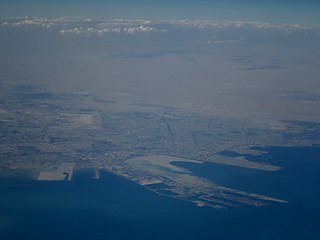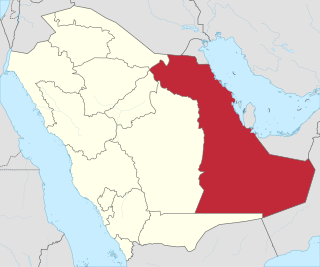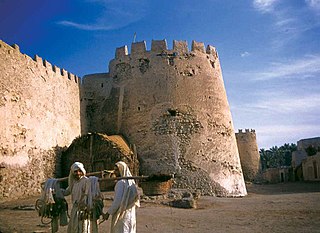
The Eastern Province, also known as the Eastern Region, is the easternmost of the 13 provinces of Saudi Arabia. It is the largest province by area and the third most populous after the Riyadh Province and the Mecca Province. In 2017, the population was 4,900,325. Of these, 3,140,362 were Saudi citizens and 1,759,963 were foreign nationals The province accounts for 15.05% of the entire population of Saudi Arabia and is named for its geographical location relative to the rest of the kingdom.

Dammam is the fourth-most populous city in Saudi Arabia after Riyadh, Jeddah, and Mecca. It's the capital of the Eastern Province, with a total population of 1,532,300 as of 2022. The judicial and administrative bodies of the province, in addition to the administrative offices of other minor governmental departments functioning within the province, are located in the city. The word itself is generally used to refer to the city, but may also refer to its eponymous governorate.
Qatif or Al-Qatif is a governorate and urban area located in Eastern Province, Saudi Arabia. It extends from Ras Tanura and Jubail in the north to Dammam in the south, and from the Persian Gulf in the east to King Fahd International Airport in the west. This region has its own municipality and includes the Qatif downtown, Safwa, Saihat, Tarout Island, and many other smaller cities and towns.
Saudi Aramco's Qatif Project is an oilfield development project in Qatif, Eastern Province, Saudi Arabia, operated by the country's national oil company Saudi Aramco.
Al-Awamiyah, also spelled Awamia, is a town situated in the Al-Qatif region in the Eastern Province of Saudi Arabia. As of 2009, it has a population of about 25,500 people. Al-Awamiyah is bordered by the Al-Ramis farms to the east and some other farms to the west and the south. To the north side, there is a dividing line between Al-Awamiyah and the neighboring Safwa city, so the town cannot expand any more and provide housing land for its growing population. Due to this limited land, the people move out of the town and settle in nearby neighborhoods, notably Al-Nasera which is home to almost 2500 people living in 250 homes.

The protests in Saudi Arabia were part of the Arab Spring that started with the 2011 Tunisian revolution. Protests started with a self-immolation in Samtah and Jeddah street protests in late January 2011. Protests against anti-Shia discrimination followed in February and early March in Qatif, Hofuf, al-Awamiyah, and Riyadh. A Facebook organiser of a planned 11 March "Day of Rage", Faisal Ahmed Abdul-Ahad, was allegedly killed by Saudi security forces on 2 March, with several hundred people protesting in Qatif, Hofuf and al-Amawiyah on the day itself. Khaled al-Johani demonstrated alone in Riyadh, was interviewed by BBC Arabic Television, was detained in ʽUlaysha Prison, and became known online as "the only brave man in Saudi Arabia". Many protests over human rights took place in April 2011 in front of government ministry buildings in Riyadh, Ta'if and Tabuk and in January 2012 in Riyadh. In 2011, Nimr al-Nimr encouraged his supporters in nonviolent resistance.

The Society for Development and Change is a Saudi Arabian human rights non-governmental organisation that became active in 2011, campaigning for equal human rights for Shia in Eastern Province, Saudi Arabia. The organisation called for a constitution and an elected legislature for Eastern Province.
Mohammed Abdulhakeem Al-Fatil is a Saudi Arabian professional footballer who plays as a centre-back for Saudi Professional League club Al Nassr and the Saudi Arabia national team.

The 1979 Qatif Uprising, also known as the Muharram Intifada was a period of unprecedented civil unrest that occurred in Qatif and Al-Hasa, Saudi Arabia, in late November 1979. The unrest resulted in 20–24 people killed in what was described as a sectarian outburst of violence between the Shi'a minority and Sunni majority in Saudi Arabia and the beginning of the modern phase of the Qatif conflict.
Rape in Saudi Arabia is regulated by Saudi Arabia's interpretation of Sharia law, under which someone convicted of the criminal offense of rape can be sentenced to a variety of punishments, ranging from flogging to execution. In 2019, eight executions took place in Saudi Arabia for rape.
The Qatif and Dammam mosque bombings occurred on 22 and 29 May 2015. On Friday May 22, a suicide bomber attacked the Shia "Imam Ali ibn Abi Talib Mosque" situated in Qudeih village of Qatif city in Eastern Province, Saudi Arabia. The Islamic State of Iraq and Syria claimed responsibility for the blast, which killed at least 21 people. The event is the second deadly attack against Shia in six months.
Al-Taraj Club is a Saudi Arabian professional sports club based in Qatif. The club was founded in 1980 and plays its home matches at the Prince Nayef bin Abdulaziz Stadium.The club was formed in 1980 as a result of the coalition of Al-Bader and Al-Shate, the only two football clubs from Qatif at the time.
Al-Noor FC is a Saudi Arabian football (soccer) team in Sanabes, Qatif City playing at the Saudi Third Division.
Al-Sahel FC is a Saudi Arabian football (soccer) team in Anak, Qatif City playing at the Saudi Second Division.
Dammam Metro is a proposed metro rail system for the Dammam metropolitan area in the Eastern Province of Saudi Arabia. The project is estimated to cost SAR 60 billion, and was originally expected to be completed by 2021.
The 2017–2020 Qatif unrest was a phase of conflict in the Qatif region of Eastern Province, Saudi Arabia, between Saudi security forces and the local Shia community, that arose sporadically starting in 1979, including a series of protests and repression during the 2011–12 Saudi Arabian protests.

The Qatif conflict is a modern phase of sectarian tensions and violence in Eastern Arabia between Arab Shia Muslims and Arab Sunni majority, which has ruled Saudi Arabia since early 20th century. The conflict encompasses civil unrest which has been sporadically happened since the 1979 uprising, pro-democracy and pro-human rights protests and occasional armed incidents, which increased in 2017 as part of the 2017–20 Qatif unrest.

Qal'at al-Qatif or Qatif Castle was a historic castle in the city of Qatif, Saudi Arabia. Initial construction of the castle dates back to the third century by the Sassanids. It was then refurbished by the Ottomans and utilized as a defensive military base for the Persian Gulf region. Later, the castle was turned into a civilian-purpose warehouse for the locals. The castle itself was a massive complex of densely populated area and several facilities, including eleven mosques, a keep for the king, keeps for the guests, which are surrounded by the citadel wall. It was oval-shaped, and John Gordon Lorimer estimated that the longest side reaches 365 meters from the east to west, and it reaches 275 meters from the north to south. At its peak, it contained the population of 5,000, and 300 shops. It also equipped moat and farmlands for orchard, connected to nearby Qatif oasis. The castle was destroyed in the 1980s, after the ownership was taken away from the locals, and the buildings and houses were gradually removed. Today, there are only 18 houses left in the field with the rest of the places turned into a public square and parking lots.
On 23 April 2019, the Kingdom of Saudi Arabia carried out a mass execution of 37 imprisoned civilians who had been convicted, 21 on the basis of confessions allegedly obtained under coercion and torture, for terrorism-related allegations in six provinces in the country. Fourteen of the people executed had been convicted in relation to their participation in the 2011–12 Saudi Arabian protests in Qatif, mostly on the basis of torture-induced confessions. The executions were carried out by beheading, and two of the bodies were left on public display. According to Saudi Arabia's Interior Ministry the convicts were all Saudi nationals. Thirty-two of those executed belonged to the country's Shia minority.







